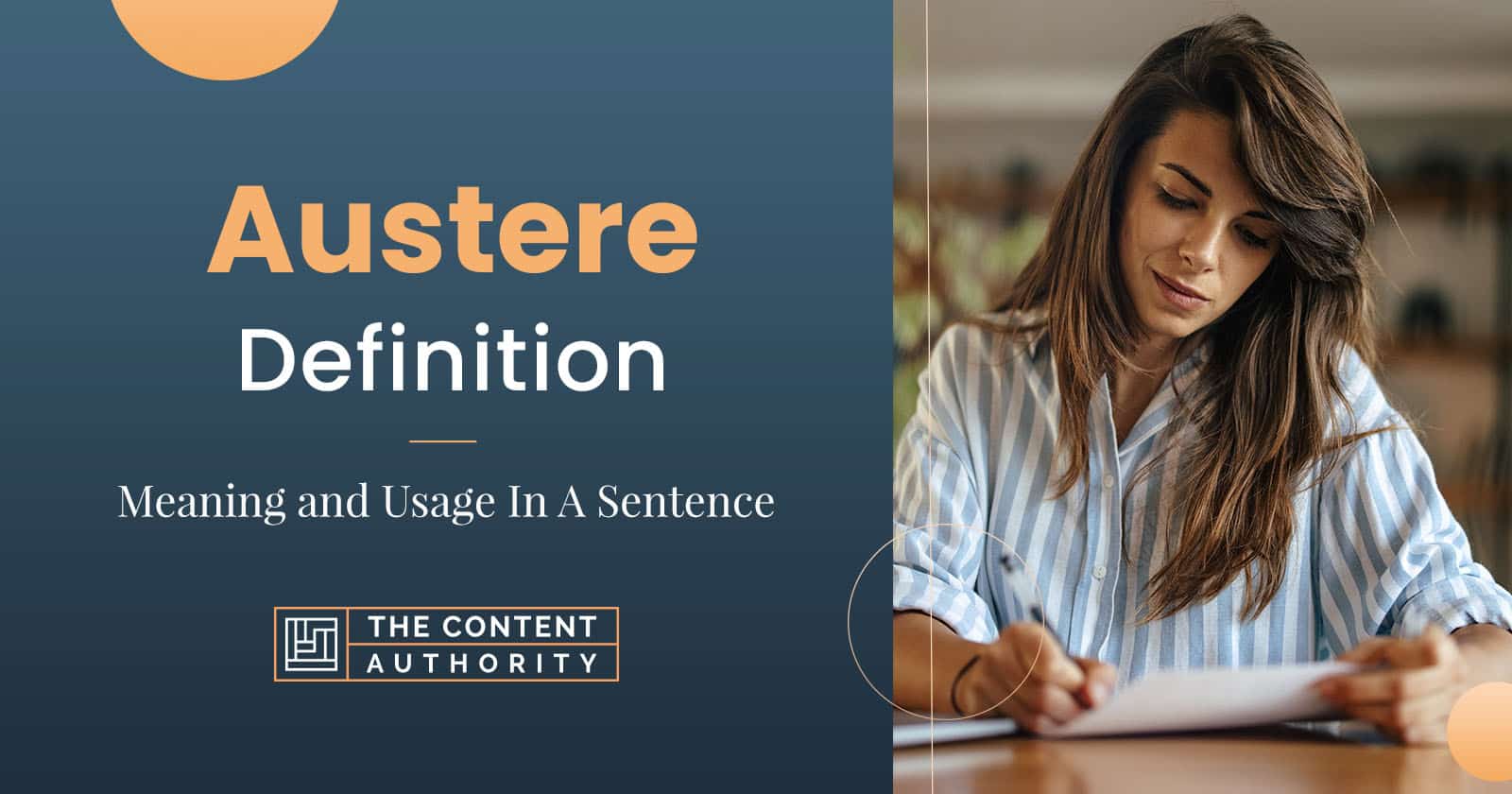The beauty of language is that it enables us to express ourselves and understand each other. It is hardly possible to comprehend anything in this world without languages. Learning new words and definitions in English helps you express yourself better; today, we learn about “austere definition” and much more.
The word “austere” is an adjective that means “severe or morally strict in terms of attitude.” In sentences, the word shows an aspect of seriousness, lack of forgiveness, and strictness. You can replace the word “somber,” “distant,” or “strict” with “austere” in your conversations or writings.
The definition of “austere” is not limited to sober or strict. There is more to the word. The article will discuss the meaning, purpose, usage, and history of the word “austere.” Such information will make it easier for you to understand this vocabulary and how you can use it to express yourself.

What Is the Definition of Austere?
The word’s definition is “stern and cold in appearance or manner.” You can also use “austere” when talking about someone or something with a severe or stern look and mannerisms.
Example sentences:
- Everybody is talking about the austere teacher who laughed loudly in the assembly.
- Though my doctor is austere, he is usually keen on helping patients.
- Being austere in the office does not necessarily mean that you are focused.
Another definition of “austere” is “somber” or “grave,” If you say that someone or something is “austere,” then it means that it is severe and not friendly in manner. It also shows harshness.
Example sentences:
- Since the street was dark, he imagined a tall and austere figure approaching him and could not stop screaming.
- I do not enjoy meeting with my accountant since he has an austere attitude.
- Though my father is austere, he strives to ensure that we have all the basic needs.
What Is the Meaning of Austere?
Another meaning of “austere” is “simple or unadorned.” In this meaning, the word “austere” describes someone or something as being plain and simple in appearance. Note that an “austere” appearance is not something most people like.
Example sentences:
- The model wore a green cotton suit and an austere yellow shirt.
- Mr. Chris’s lessons are usually austere and simple.
- One of the main reasons the employees were not motivated was the austere office decoration.
“Austere” also means “giving little or no scoop or pleasure. In this case, when you say something is “austere,” it means that you or most people do not find pleasure in doing it. These are things or undertakings that do not have luxuries.
Example sentences:
- The lives of the missionaries were still comparatively austere.
- I cannot fathom living the austere life that the nomads live in the desert.
- James described prison life as austere.
Family Words of Austere
The beauty of the English language is that you can change the words to different formats to fit the particular part of speech. The family words will help you use the word even when the tense changes. Here are some two-word forms of “austere.”
Austerely: Austerely is an adverb, and it has several meanings.
- Meaning one: “In a way that is simple, plain, or without decoration or unnecessary details.”
- Meaning two: “In a way that has only the necessary things or due to the severe limitations on money and goods.”
- Meaning three: “In a severe and unfriendly way.”
Example sentences:
- The bride’s dress was simple and austerely elegant.
- Jack’s parents were poor, so he has lived an austere lifestyle.
- The tour guide told us to arrive on time with an austerely harsh tone.
Austereness: Austereness is a noun and also has many meanings.
- Meaning one: “The state of being harsh, sour and acerbity.”
- Meaning two: “Someone of something that is extremely plain.”
- Meaning three: Having no adornment or ornamentation.”
Example sentences:
- The austereness of the statue makes most people fear going to the museum.
- Though he is a great tailor, the austereness in his style makes him seem incompetent.
- The crowd had the liberties of general austereness of life and the readiness to suffer their convictions.
Synonyms and Antonyms of Austere
Expand your vocabulary by learning the synonyms and antonyms of the word “austere.” They include:
Synonyms
- Authoritarian
- Hard
- Harsh
- Heavy-handed
- Ramrod
- Flinty
- Severe
- Stern
- Rigorous
- Tough
Antonyms
- Forbearing
- Gentle
- Lax
- Tolerant
- Clement
- Indulgent
- Lenient
- Fancy
- Gluttonous
- Soft
- Sweet
How to Use Austere in a Sentence
Before using austere in a sentence, note the context where you will use the word. Use the word as an adjective. In its various forms discussed earlier, the word also fits as an adverb or noun based on the context.
Before you start creating various sentences, let us learn more about “austere” to have an idea of how the word applies in various subjects. With this, using the word in sentences becomes easy.
What Type of Word is Austere?
Austere is not usually a positive word since it refers to a person or thing that is not pleasurable. The word describes something stern that does not have anything attractive. You would not want someone to describe you as austere because it means people have a negative attitude towards you.
What Is Austere Wine?
If you are a wine lover, you’ve probably come across the phrase austere wine. The wine enthusiasts describe this wine as acidic, tight, and tannic. The wine can also have subtle aromas and flavors. In some instances, this word might be negative, but some believe that this is a wine that has potential and could blossom over time.
What Is Austere Beauty
The word austere beauty is usually confusing for most people who do not understand it. It simply means authentic beauty, that is, simple and plain beauty without any decorations or additions.
What is the Austere Measure?
The term austere measure refers to economic policies implemented by the government to lessen the government spending and ensure that the public debt reduces to shrink to the budget deficit. It can also apply in financial institutions or businesses,
What Is Austere Environment
If you say that something or someone is in an austere environment, then it means that access to clean water, electricity, and the fixed-mobile facility is degraded or denied. It also means the diagnostic and treatment resources and medical personnel are unavailable.

What Does It Mean To Practice Austerity?
According to most religions, there is a truthful supreme being, and those who believe religion should abide by his tenets. This is practicing austerity.
10 Examples of Austere in a Sentence
At times definitions and meanings might not be enough to help you understand a word. So, you will need to look into sentence examples to learn more. Keep reading to learn more!
- I liked the art show and how the artists brought a new meaning to the word austere.
- He is training hard and in austere conditions since he does not want the opportunity to join the army to pass him by.
- The pictures Cameron showed us were austere, and I still do not know what everyone found to be fascinating about them.
- It is not easy to see the word austere in a sentence.
- The elevator opened to an austere reception area, and you could feel the freshness.
- It is strange how many theater workers are living in austere conditions.
- The combinations of the colors seem austere and pointless.
- The last thing I could remember was the physicians giving me an austere expression.
- I like the movie since it has an austere bitter-sweet setting.
- Though Wilson is a good man, his fashion was austere.
How Do You Spell Austere?
The word “austere” right spelling is “A.U.S.T.E.R.E.”
How Do You Pronounce Austere?
The pronunciation of “austere” is “aa.steer” or “aw·steeuh.”
How Many Syllables Are In Austere?
The word “austere” has two syllables.
These syllables are divided as “aus.tere.” The stressed syllable is “tere.”
History and Entomology of Austere
Austere is derived from the Greek word “austere,” which means harsh, hard, or bitter. It was mostly used to describe fruits or wines that make the tough dry. The Latin borrowed the word and used it as “austere” but retained the Greek meaning.
Around the 13th century, the Old French introduced “austere,” which means “harsh, strict, and cruel.” From the late 14th century, the English language borrowed the word and used it as “austere,” meaning “grave, serious, and without luxuries.”
When Was The Word Austere First Used?
The first records of the word “austere ” were in the late 1300s.
Conclusion
We have discussed everything you need to know about the word “austere” and the various ways you can use the word in your sentences. The word “austere” is mainly negative, and when using it in your sentences, this is one of the vital things to consider.
Again, when learning a new word in the English language, the best way to understand the word is to read the crucial details, understand relevant information, and keep practicing the word in your speech and writing.
Shawn Manaher is the founder and CEO of The Content Authority. He’s one part content manager, one part writing ninja organizer, and two parts leader of top content creators. You don’t even want to know what he calls pancakes.

